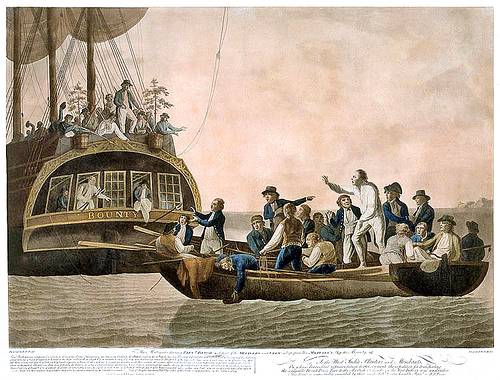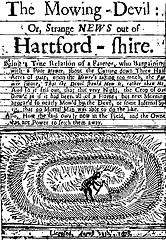“Humankind cannot stand very much reality.” — T.S. Eliot
Synchronicity
In 1805, the French writer Émile Deschamps was treated to some plum pudding by a stranger, Monsieur de Fontgibu.
Ten years later, Deschamps ordered plum pudding at a Paris restaurant, but the waiter told him the last dish had already been served to another customer — to M. de Fontgibu, as it turned out.
Seventeen years after that, in 1832, Deschamps was once again offered plum pudding, and he told his friends about the strange coincidence. At that moment, M. de Fontgibu entered the room by mistake.
“Three times in my life have I eaten plum pudding, and three times have I seen M. de Fortgibu!” Deschamps exclaimed. “A fourth time I should feel capable of anything … or capable of nothing!”
Fast Living

When Captain Cook visited Tonga in 1777, he gave a tortoise to the royal family as a gift. They named it Tui Malila. Tongans must be good with tortoises, because Tui lived through the French Revolution, the Louisiana Purchase, the invention of the telegraph, the American Civil War, the first telephone, the opening of the Brooklyn Bridge, the dedication of the Statue of Liberty, X-rays, the Spanish-American War, McKinley’s assassination, the first zeppelin, Einstein’s relativity, the Model T, the sinking of the Titanic, World War I, the Russian Revolution, Lindbergh’s flight, the Great Depression, the Spanish Civil War, World War II, the founding of the United Nations, the breaking of the sound barrier, Gandhi’s assassination, the Korean War, the first nuclear submarine, I Love Lucy, Sputnik, the Bay of Pigs, the Cuban missile crisis, and Kennedy’s assassination, dying finally in 1965 at age 188.
Compare that to Timothy, pictured here, an English celebrity who led a dashing life: Found aboard a Portuguese privateer in 1854, Timothy served as a mascot on a series of Royal Navy vessels until 1892, when she retired. (“He” was discovered to be female at age 82.) She was taken in by the Earl of Devon, who etched his family motto on her underside: “Where have I fallen? What have I done?” She died in 2004 and was buried near the earl’s home, Powderham Castle, at age 160.
Moral: Live hard and you’ll die young.
Mary Sans S
A familiar nursery rhyme rewritten to omit the letter s:
Mary had a little lamb,
With fleece a pale white hue,
And everywhere that Mary went
The lamb kept in her view;
To academe he went with her,
Illegal, and quite rare;
It made the children laugh and play
To view a lamb in there.
— A. Ross Eckler
“Pitkern”

The mutiny on the Bounty is a landmark of sea law, but it also has a curious linguistic sequel. After setting Captain Bligh adrift, Fletcher Christian fled to Pitcairn Island in the South Pacific. With him were eight other crewmen, six Tahitian men, and 11 women. In order to understand each other, they developed a creole mix of English and Tahitian known as “Pitcairnese”:
| English | Pitkern |
| How are you? | Whata way ye? |
| Where are you going? | About ye gwen? |
| Are you going to cook dinner? | You gwen whihi up suppa? |
| Would you like some food? | Ye like-a sum whettles? |
| I don’t think so | I nor believe |
| It doesn’t matter | Do’ mine |
The mutineers were a diverse lot, with origins from Scotland to the West Indies, so the mix is a linguistic hodgepodge. For instance, “whettles,” above, meaning food, is a throwback to the Old English victuals.
A Meta-Record
The Guinness Book of Records is in The Guinness Book of Records.
It’s the world’s best-selling copyrighted book.
The Evils of Broadway
“With drunkenness, gambling, and dancing, theater-going dates from the beginning of history, and with these it is not only questionable in morals, but it is positively bad. Every one who knows any thing about the institution of the theater, as such, knows that it always has been corrupting in its influence. Not only those who attend the theater pronounce it bad, as a whole, but it is frowned upon by play-writers, and by actors and actresses themselves.”
— J.M. Judy, Questionable Amusements and Worthy Substitutes, 1904
Freud’s Couch

The couch used by Sigmund Freud during psychoanalytic sessions. “I have found little that is good about human beings,” he wrote. “In my experience most of them are trash.”
… Tune In …
Winona Ryder and Uma Thurman have the same godfather.
Timothy Leary.
A Field of Flames
Here’s one explanation for crop circles:

This English woodcut pamphlet was published in 1678. It tells of a farmer who swore he would rather have the devil mow his field than pay the high price demanded by a laborer.
According to the pamphlet, that night his field appeared to be in flames, and the next morning it was found to be mowed to supernatural perfection.
Maybe so, but if that’s what causes these things, the devil’s been getting awfully fancy lately:

